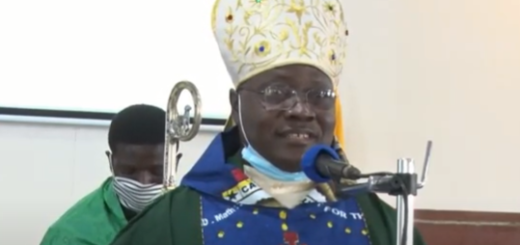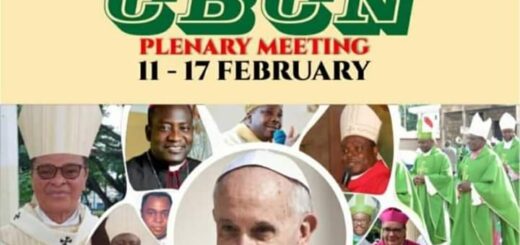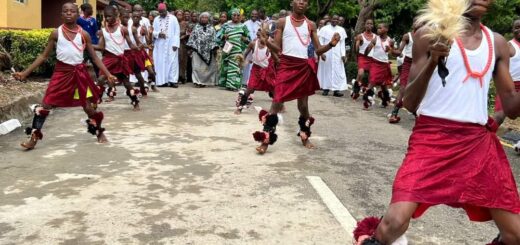The Blessed Trinity: Our Model of Community Life and Love
by ARCH BISHOP · June 4, 2023
Holy Trinity Sunday, 4th June 2023, Our Lady Queen of Nigeria Pro-Cathedral, Abuja. Homily by Archbishop I. A. Kaigama.
Readings: Ex. 34:4b-6, 8-9; 2 Cor. 13:11-13; Jn. 3:16-18
The Blessed Trinity: Our Model of Community Life and Love
St. Paul spoke to the Athenians (cf. Acts 17) about their worshipping the “unknown God” and explained that this God is the one in whom we live, move, and have our being. The readings today reveal to us the nature of God, in whose name St. Paul greets the Corinthians: “The grace of our Lord Jesus Christ, and the love of God, and the communion of the Holy Spirit ….” (2 Cor. 13:13).
What today we celebrate is the central mystery of our faith and the essence of God. The Catechism of the Catholic Church teaches: “The Trinity is One. We do not confess three Gods, but one God in three persons….” (cf. nos. 253-255).
We cannot rationally or scientifically explain God. He is a mystery, a reality that is to be believed and lived through the eyes of faith. When the heresy of Arianism denied the divinity of Christ, the Church responded in the words of St. John: “In the beginning was the Word. And the Word was with God and the Word was God….” (Jn. 1:1).
In our native languages we call God, Olodumare, Chukwu, Aondo u Hembanage, Obasi, Kurumam, etc., meaning the same God who revealed Himself to Moses in the first reading as merciful, gracious, slow to anger and rich in kindness and faithfulness (cf. Ex. 34:6).
Though the Mother Church through the ecumenical Councils of Nicaea and Constantinople teaches that there are three Persons in One God, we cannot find the word “Trinity” in the bible, but we know that it is a designation for God revealed in Sacred Scripture. At creation, God said, “let us [Father, Son and Holy Spirit] make man in our own image and likeness” (Gen. 1:26). Jesus commissioned His disciples to “Go therefore and make disciples of all nations, baptizing them in the name of the Father, and of the Son, and of the Holy Spirit” (Mt. 28:19). The account of the infancy narrative (cf. Mt. 1-2, Lk. 1-2), the baptismal theophany (cf. Mt. 3:13-17), the story of Jesus’ temptations (cf. Lk. 4:1-13), the transfiguration (cf. Mt. 17:1-13), and Jesus’ paschal mystery also testify to the reality of the three Divine Persons.
The unity and harmony in the Holy Trinity should be our model in our society plagued by divisions. It is no secret that we are divided along ethnic, social, economic, and political lines; but we must strive harder to live out the spirit of our national motto, “unity and faith, peace and progress.” Even while we wait for the final declaration by the courts about Nigeria’s last elections, we must tell our constitutionally sworn-in leaders that we must recapture those traditional African values where there was a great sense of belonging and where everyone was appreciated and respected.
Our leaders must take the lead in the pursuit for what unites, foster a true spirit of nationhood, good neighbourliness and patriotism over sectional interests, ethnic loyalty, or religious myopia. They must make deliberate efforts towards healing the political wounds and managing our diversity well. The unfavourable effects of the recent increase of the price of fuel occasioned by the removal of the subsidy on petroleum must be urgently addressed.
It is nice to be back home. I had to travel to Portugal for a meeting after which I took two weeks out of my one-month annual break to rest. We began that meeting with a pilgrimage to Fatima where I saw great signs of faith as the young and the old flocked in from all parts of the world to pray, with some crawling on their knees as a sign of repentance.
I also visited Santiago de Compostela in Spain, where tradition has it that the Apostle James was buried, I saw huge crowds; from America, Asia and Europe, some trekking for days to arrive there as a penitential exercise. On Pentecost Sunday, the queue was so long that by the time some got into the Church, the Mass was over!
While I was abroad, I had no experience of failure of electricity; no water shortage; I saw good roads which lead to small settlements. I could leave for the airport at 2 am or 4 am with no slightest fear of being attacked by bandits or terrorists. Where I stayed, my room faced the hills and forest; there were no burglary proofs; I could open the balcony window and stroll out at night. This I can no longer do in my dear country!
We call on our leaders to restore security, break the network of corruption and reduce the high cost of governance which are mainly responsible for the poor infrastructure and people rationalizing acts of corruption.
We hope that there will be an end henceforth to borrowing huge sums of money (piling humongous debts) and not putting them to productive use. Nigeria is unable to construct excellent hospitals and schools and our leaders with the means are often seen patronizing these institutions abroad where things are working normally, instead of replicating the same facilities at home.
We hope decency will be enthroned again from top to bottom. On Friday evening when we arrived from abroad and while waiting in the airport for our luggage, the light went off and the conveyor belt stopped. Many chorused: “Welcome back to Nigeria.” After finishing with my passport, the official said, “na only blessing remain” (not spiritual blessing of course).
Another official said, “Daddy welcome, anything for us?” We beg the government to give workers their proper entitlements to do away with these shameful and embarrassing begging attitudes.
As my work is to pray and preach, I urge us all to grow in the true love of God, love of one another and to be truly companions along this life’s journey to eternity.




